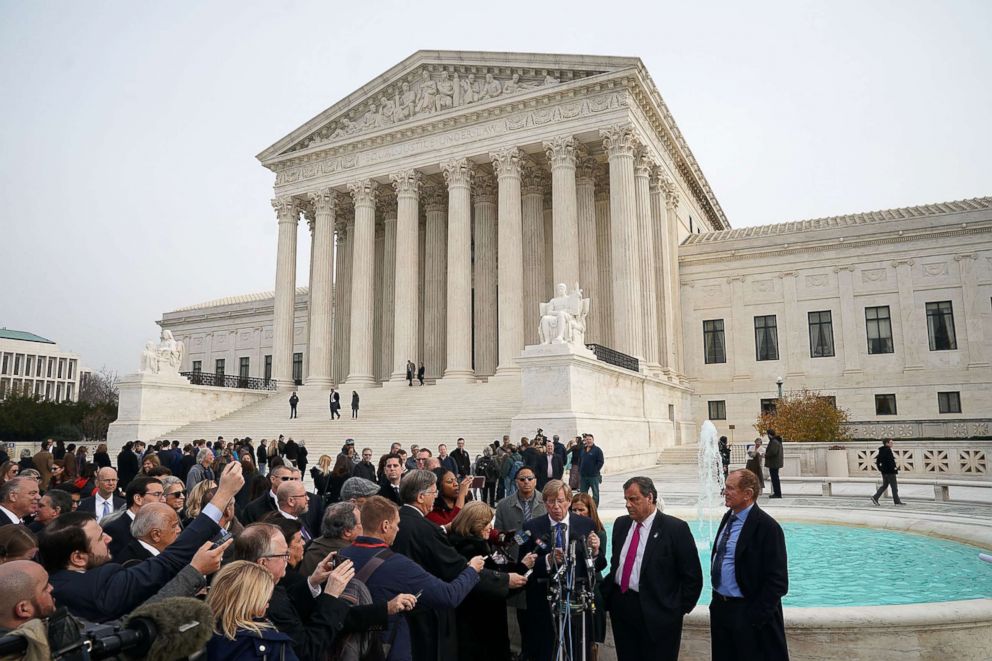Supreme Court mulling scrapping law prohibiting sports betting
The high court will decide whether states can legalize sports betting.
— -- The Supreme Court signaled Monday that it might allow New Jersey to legalize sports betting, doing away with a federal law that prohibits states from sponsoring, operating, advertising, promoting, licensing or authorizing sports gambling.
In 2012, New Jersey Gov. Chris Christie signed legislation that modified the state's sports gambling prohibition, allowing sports betting at casinos and racetracks.
The NCAA, along with the NFL, NBA, NHL and MLB, immediately filed a lawsuit arguing the law violated the 1992 Professional and Amateur Sports Act.
Lower courts have ruled in favor of the challengers and in June, the Supreme Court agreed to hear the case.

Here is what you need to know:
What is the Professional and Amateur Sports Act?
The act, passed in 1992, prohibits states from sponsoring, operating, advertising, promoting, licensing, or authorizing sports gambling, and it prohibits individual conduct pursuant to any such state law. Nevada, Oregon, Delaware and Montana were exempt from the statute.
Congress, along with the backing of the NCAA, NFL, NBA and NHL was concerned that sports betting would hurt the "integrity" of the game. "Sports gambling threatens to change the nature of sporting events from wholesome entertainment for all ages to devices for gambling,” Congress said at the time.
What is being challenged?
New Jersey argues the law violates the 10th Amendment’s “anti-commandeering principle,” which limits the degree to which the federal government can compel the states to enforce federal law.
Christie, in legal briefs, argues that: "Never before has congressional power been constructed to allow the federal government to dictate whether or to what extent a state may repeal, lift, or otherwise modulate its own state-law prohibitions on private conduct."
The NCAA and four professional organizations disagree with New Jersey's arguments saying, the law "is a straightforward exercise of Congress’ power to preempt the operation of state laws that conflict with federal policy on matters within Congress’ purview."
Importance of the case: State's rights
John Holden, who has written a friend of the court brief in support of New Jersey, argues that there's more on the line than gambling.
"This case is a lot bigger than sports gambling and more about what a state can do when it doesn’t agree with federal policy preferences," Holden argued.
When will we get a decision?
A decision will be rendered before the close of the court's term in June.
On Monday, some of the justices argued the statute could violate the 10th Amendment.
Justice Stephen Breyer suggested the federal law appears to be "telling states what to do" and that would fall within the definition of “commandeering.”
Chief Justice John Roberts pointed to the phrase “pursuant to the state” as an indication that Congress may have given power to states when it didn’t give the states guidance on how to enforce the law.
"If the state law says you can do it, that's the only situation in which it's illegal," said Roberts. "If the state law doesn't say anything about it, well, feel free, you can do it.”
But Justice Sonia Sotomayor offered a reason for concern.
“So why don't we -- why don't we legalize -- this is a hypothetical -- marijuana because all -- and all drugs, because there's a rampant market out there for those drugs, but we've made a policy choice that we don't want the state involved in promoting that type of enterprise,” she said.




